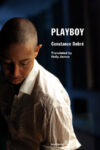
[Dalkey Archive Press; 2021]
António Lobo Antunes is a living grandmaster of literary modernism. He has published over three dozen high caliber novels since the late 1970s, with English translations coming out since 1990. First appearing in 1999, Warning to the Crocodiles is another major work, thrillingly narrated and beautifully written like the rest of his oeuvre; so, it is excellent indeed that Dalkey Archive has published this translation, furnished by Karen C. Sherwood Sotelino, who now joins the likes of Margaret Jull Costa, Richard Zenith, and the late Gregory Rabassa in bringing what many would call Portugal’s best fiction writer to anglophone readers.
Prior to delving into the novel itself, there are some basic facts about Lobo Antunes’s life and 20th century Portuguese history that must be established, since they are absolutely central to the author’s work. Lobo Antunes is a practicing psychiatrist, and before he became a writer he served as a medic in the colonial war in Angola from 1971 to ‘73. At home, the Portuguese people lived under the overbearing Catholicism and fascist terror of the corporatist Estado Novo regime, established by prime minister Salazar in 1933, and taken over by president Tomás and prime minister Caetano in 1968 when Salazar fell ill. By the end of its 50-year lifespan, the government was barely coping with the national liberation movements waging armed struggle in its African colonies of Angola, Guinea-Bissau, and Mozambique. In April 1974, a year after Lobo Antunes returned home, the regime collapsed in a military coup. A new republic was organized, and Portuguese forces withdrew from the newly independent African countries, bringing 500 years of Portuguese colonialism to an end. It is this political sequence and its lingering effects that Lobo Antunes repeatedly examines in his work, in various aspects and through various layers of class society, from the capitalists and clergy to the cannon fodder soldiers, farmers and house laborers, sex workers, and lumpen dregs haunting the streets of Lisbon.
Warning to the Crocodiles takes place in the years after the fall of the Estado Novo, centering on the violent clandestine acts committed by a group of counterrevolutionary plotters, showing how reactionary oppressors never quit the stage of history peacefully. In an isolated bourgeois house guarded by ex-policemen, a hotel owner and his ailing wife plot killings and attacks with dissident military officers and a bishop who frequently come to the house to meet up. The novel unfolds through the voices of four women collaborators. Mimi, the wife of the businessman, a cancer patient, and deaf, lying with her wig on her home’s veranda. Fátima, who has left her husband for the bishop, also her godfather, has witnessed some of the group’s most violent acts. Celina is the mistress of Mimi’s husband, and they often speak openly before the wife because of her deafness. And Simone, who lives in the garage with the chauffeur (who designs explosives), is disturbed by the tapping of the oak tree on the garage window, and is essentially treated like a servant by the rest of the household. Reading a paraphrase like this, one might expect a political thriller that turns into a locked room mystery. But the elements of a crime story only come in tantalizing bits amongst swaths of polyvocal and overwhelmingly high quality writing. It’s forbiddingly difficult to put together a timeline of the plotters’ activities or the backgrounds of the players involved; Lobo Antunes doesn’t create fictions where such things can be wholly known.
Instead, what he does is take the reader deep into the minds of his characters through experimental forms that blur the line between narrative reporting, subjective description, and pieces of writing from the story world itself. In this book, events of the present moment commingle with memories, presenting themselves to readers as a congealed mass of perceptions — similar to when you can’t help but ruminate on a conversation you had at home when you’re currently on a night out, or vice versa. Even the basic events of a scene are related in a challenging and ultimately thrilling style. Such as when, early in Warning to the Crocodiles, Fátima recalls watching “the commander” trigger a bomb to attack a priest as he drives through the countryside. He takes position behind a stand of walnut trees,
wrapped up in an old blanket his tongue freezing, he’d definitely fallen asleep because his neck was stiff and he woke up at the sound of the first engine, his tendons were numb, his shoulders felt odd, he wrapped his hand around the lever, following the truck there was a gypsy wagon with a donkey tied to the shaft, a group of wild ducks in V formation looking for the river, insects buzzing around as if the universe were made up of vibrating antennae and wings, bicycle riding farmers, sparrows, a tractor, oxen pulling a plough along a trail of mulberries, the hand-cranked telephone they stole from the army, the wild ducks in V formation had found the river since their loud quacking could be heard…[.] (italics in the original)
To read a typical passage like this is to be at once steeped in remembrance while blasted with sediments of action and imagery. Notice the abundance of progressive -ing verbs: insects buzzing, farmers biking, ducks looking, oxen pulling. Lobo Antunes’s locales are always filled with activity, human and natural, and his characters are grafted onto these lifeworlds like barnacles to a ship, while receiving the world and representing it linguistically in ways that critics have compared to Faulkner, Dos Passos, and Céline — writers who have shown us beauty within the obscene and literary merit within the vulgar. Yet all these -ing verbs amount to a kind of stasis, mired in subjectivity. Their organization within the mental worlds of the characters isn’t disposed to the kind of coherence or progression we expect from conventional fiction.
What these characters do give us, however, is dazzling expressionistic language. For example, Celina in her narration dwells on the fishing trips to the Tagus river that she took with her uncle and parents when she was little. During one of them she remembers seeing “the body of a run-over cat, like a package of fur,” that seems to be examining her. A bus runs it over, and now it’s “pleading with the storks for help.” Seven or eight more buses, and it becomes “a rag of blood.” Many of Lobo Antunes’s characters have literary aspirations, especially in his early books, and they sometimes experience hallucinations after getting wasted in Lisbon’s cafés and dives. But in Warning to the Crocodiles, these flights of language seem to signal the way memories can short-circuit a person’s will to stamp themselves onto their consciousness, replaying endlessly in their head, bypassing all sense of before or after to create an oppressive present of recurrence. Lobo Antunes represents this way of remembering through bracing passages of noun clauses, details, and activities, while lines of unattributed speech intrude, often to undermine what the narrators are trying to represent for themselves, as one’s own poisonous thoughts may often do. Simone at one point states, “I may live with the driver but I’m not one of their servants,” and in parentheses spontaneously recalls, “( — Take the plates from the right, Simone, serve from the tray on the left).” Some narrators, like Fátima, seem divided against themselves in terms of how much they know, as if speaking under interrogation. At one point, a second speaker interrupts Celina’s narration to bring up even more details. Just when the reader seems to have a grip on how Lobo Antunes uses italics and parentheticals — to indicate an especially indelible memory, or to enclose brief statements from the women’s mothers and husbands — the text employs them in a different way. Reading this fiction is like keeping up with a game that keeps tweaking its rules yet, in its doing so, is never unfair.
If this dense prose texture sounds unwieldy, Lobo Antunes contains his linguistic hurly burly within a rigorous structure, as he usually does in his work. Each of the four women takes a turn narrating a numbered chapter, cycling through the speakers in the same order eight times, for 32 chapters total. He used a similar round-robin narrative structure in his 1983 masterpiece Fado Alexandrino, about three military officers and a soldier out on a bender and reminiscing about the ‘74 coup. Warning to the Crocodiles is an interesting foil to that book, both for the matching template, and for offering a quartet of flawed, damaged and complicated female characters — since the women in Lobo Antunes’s fiction so often appear objectified and debased in the lecherous eyes of the men.
So how is it that these four women got involved, or roped into, this conspiracy to undo democratic Portugal? Lobo Antunes may be a professional, but he is not interested in providing some tight psychoanalytic explanation. Everyone has their reasons, but such rationales are not in the foreground of any of these women’s minds. Indeed, they don’t seem to have that much regard for each other. Fátima mildly envies Celina’s relative youth and wealth. And to everyone else, Mimi is just an odd deaf woman, with Simone finding her “less important than the oak tree and less alive than a corpse.” These speakers spend most of their time brooding on totems from their pasts. Mimi remembers her late grandmother, whose hair smelled of brandy, and who touted knowledge of the secret formula for Coca-Cola. Fátima resents her father who had more sympathy for the pet canary than for her; and her attraction to her bishop godfather occurs in spite (or because) of the Catholic opprobrium dealt to her just for buying a pregnancy test when she was young. Celina grew up watching her uncle seduce her mother, and he then seduced her in a different way, entertaining her with a Mickey Mouse doll at her bedside. Simone was tormented for her weight as a child, and she remembers destroying her own school photo, although she seems to look fondly on these memories compared to her present situation. None of these women particularly approve of the kidnappings and grisly killings they witness and partake in, but there’s no sense of responsibility. At least a couple of them wish to escape, but they can’t seem to take the initiative.
One suggestive clue to what this novel may be saying about human behavior comes from another of Lobo Antunes’s stylistic trademarks, namely the use of grammatical agency. Fátima, for instance, describes her daily existence as being persecuted by objects, first the “ingratiating” morning sun that follows her from room to room.
After the sun finally stopped teasing me, the gas started having fun at my expense. Seriously, the terrible attitude of objects is beyond me: I’m not even talking about mirrors, always at the ready to find fault, I’m just talking about pen tops rolling off to God only knows where, coin purses never found where we left them, slippers, we can only find the right one feeling around with our feet, the front door keys simply taking off on their own…[.]
The “terrible attitude of objects” is taken up by Simone much later in the novel, where a narrative fragment has her hustling through the woods behind the house at night:
the brambles and the pine needles would stop hurting my legs, the flashlight would stop tracing ovals in the pine needles, if I paid careful attention I’d hear the oak tree branches scraping against the garage, the obsessions that things have the same as people have but they don’t have feelings and whims like people do, who knows…[.]
Like so many of Lobo Antunes’s lost souls, these women have very little space and time to reflect on their choices, since they are thinking about the degree to which the world and all its parts remain hopelessly out of their control. Self-serving as this attitude may be, behind it is a profound resignation to the suffering, isolation, and backwardness that form the women’s everyday existence.
Warning to the Crocodiles also makes a fascinating point about Portugal’s historical situation. In her first chapter Fátima recalls a meeting taking place in the house between “the general” and “the commander.” The narration flows seamlessly into the commander’s activities: “near the Spanish border recruiting soldiers, guardsmen, former fighters from Guinea, ex-policemen, poor souls back from Mozambique and Angola ready to invade Portugal, get rid of the Communists, free Africa from the Russians in the name of what they call the Homeland… (italics in the original).” These lines repeat themselves verbatim a page later, and a slogan from the bishop, “This is a holy war, my friends,” echoes throughout the rest of the novel. The gathering of the colonial forces now dispersed after the coup and the winning of independence described here recalls the historical development of fascism in Europe. In her 1923 report to the Communist International, Clara Zetkin talks about how the decayed economic conditions of European countries after the first world war, where even intellectuals and salaried professionals faced extreme poverty, provided the grounds for fascist organization to take root. She singles out the “former officers, noncoms, and the like, who have neither employment nor profession,” even in the victor states. Just as the demobilized military classes of Europe became a “contingent” of fascism, the Portuguese far right in Warning to the Crocodiles conspires to round up the remaining elements of the failed colonial wars — a repetition of history, a farce.
Such a farcical atmosphere is a major aspect of Lobo Antunes’s fiction, and it goes beyond the “gentlest of self-mockery” that J.M. Coetzee mentions in his blurb for this book. In Lobo Antunes’s novels, terminally alcoholic characters stagger in the streets with delusions of grandeur, and officers are often caught literally with their pants down. One scene in the novel Return of the Caravels has asylum inmates lining the coast to await a mythical savior king who never appears. In Warning to the Crocodiles, the Coke recipe that Mimi’s grandmother jealously guarded in order to make the family rich turns out to be coffee and sweetened soda water, which in turn gets comically misunderstood as the novel’s events unfold. Whatever religious and aesthetic legacy or aristocratic power southern Europe may have had, here, it winds up deflated and soiled. All his cast of characters can do is cling desperately to the nearest fragments of the world and repeat mantras in their heads. These are pathetic lives, but, while they provoke sardonic mirth, there is a broad and recognizable need for comfort and understanding betrayed by these neurotic narrators.
I return again and again to Lobo Antunes’s fictive worlds because, with his use of pitch black humor and his precise attention to humanity (and the ways humans can be humiliated) against a broader historical backdrop — this supposedly impossible fusion of aestheticism and social reference — his fictive worlds seem inexhaustible. But with so many novels after 2000 yet to be translated into English, there is plenty of time before we can say this splendid corpus of fiction is exhausted.
As for the title, Warning to the Crocodiles, there is no explicit mention of the reptile in the actual text. The titles of Lobo Antunes’s books tend toward the allusive, and here the allusion is to the most dyed in the wool reactionary sections of Portuguese society. As Sherwood Sotelino points out in her short but substantial introduction, these people are blind “to the futility of their endeavor,” because of their “ingrained nostalgia” for the old “patriarchal, Catholic, inward-looking” Portugal, “when they were powerful and important.” A protagonist in an early novel by Lobo Antunes, translated as The Land at the End of the World by Margaret Jull Costa, speaks of visiting the zoo with his father, how the animals seemed the most real on Sunday mornings, the ostriches, the penguins, the hippopotamuses, the cobras, and last but not least, the crocodiles that “seemed reconciled to their Tertiary-age fate as mere lizards on death row.”
Alex Lanz has published stories, essays, and criticism in magazines including Entropy, Shantih, and Empty Mirror. They live in Brooklyn.
This post may contain affiliate links.







